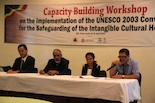Second training seminar for the ratification of UNESCO’s Convention of 2003

The Secretariat of State of Culture, in collaboration with UNESCO, organized during three days (from April 10th to April 12th, 2012), in Hotel Timor, the Second training seminar for the ratification of UNESCO’s Convention, that aims for the preservation of the intangible cultural heritage.
The aim of the seminar is to offer opportunities to participants, to gain skills in the protection, for the future – for the upcoming generation – of the intangible cultural heritage of the State.
“This training aims to conjugate actions aiming to support Timor-Leste in the process of ratification and implementation of UNESCO’s Convention 2003, in order to preserve intangible cultural heritage”, informed Virgílio Smith, Secretary of State for Culture.
“The preservation of the national identity of the independent and sovereign Country depends on several steps that we all know, in the protection and appreciation of our culture. It is for the Government and the State to assume responsibilities in the use of mechanisms and technical and financial resources to develop services to preserve our wealth. However, it is not only up to them, it is also necessary the involvement and active participation of all social layers, interested in protecting their own culture. It is in this aspect that UNESCO’s Convention 2003 is encouraging our community on preserving the heritage, taking part in this great mission of preserving, protecting and enhancing it”, advanced the Secretary of State.
The representative for UNESCO’s National Commission in Timor-Leste, Jacinta Imaculada, referred that this Commission has, in its strategic plan for 2010, the definition of some priorities related to “intangible cultural united” and is ready to cooperate with UNESCO and the Secretariat of State of Culture, as well as with the other Government and civil society’s partners, in creating conditions for the Convention on Cultural Heritage to be ratified and implemented soon.
The Ambassador of Japan in Timor-Leste, Yoshitaka Hanada, considered the intangible cultural heritage as a nursery for the adaptation of different cultures, as an important factor to maintain diversity over globalization and social transformation, which can have an impact on human life, on the relationships with others and on the environment.
It is my expectation that, through this seminar, critical moments of capacity building and awareness, nationwide, can be overtaken, through a sustainable framework in the preservation of the intangible heritage”, stressed Yoshitaka.










































